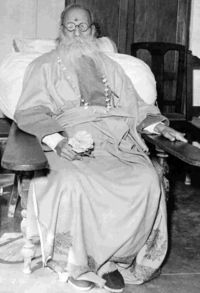Das, Bhagavan
(1869-1958). A distinguished scholar and theosophist. Born January 12, 1869, at Banaras (now Varanasi), India, into a landholding family of bankers, Das had a distinguished academic career, gaining his B. A. at the age of sixteen and M. A. (Philosophy) at eighteen. He joined the Theosophical Society (TS) in 1884.
Das was in government service as Deputy Collector and magistrate in Uttar Pradesh from 1890 to 1899; he resigned to accept the position of Honorary Secretary of the Board of Trustees and Managing Committee for the Central Hindu College. Das was awarded the T. Subba Row Medal in 1900. In 1921 Das was sentenced to one year imprisonment by the British for association with the Non-Cooperative Movement, but was released after only five weeks on a motion of the Government.
For many years Das served on the All-India Congress Committee and was elected to the Legislative Assembly in Uttar Pradesh in 1934. Publications include:
The Science of the Emotions (1900, rev. ed. 1924), The Science of Peace (1904), The Science of Social Organization or the Laws of Manu in the Light of Theosophy (1910), The Science of the Sacred Word being a summarized translation of the Pranavavada of Gargyayana (3 vols., 1910, 1911, 1913), The Metaphysic and Psychology of Theosophy (1921), The Essential Unity of All Religions (1932, rev. ed. 1936; reprinted 1966), and Annie Besant and the Changing World (1934).
© Copyright by the Theosophical Publishing House, Manila
